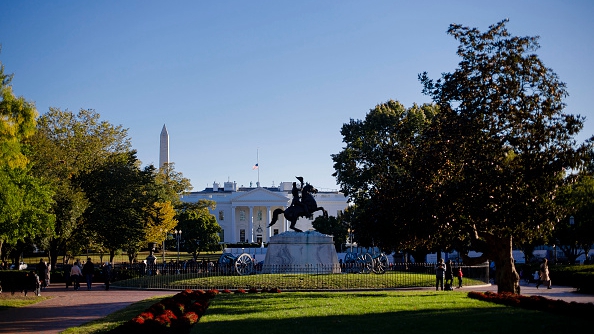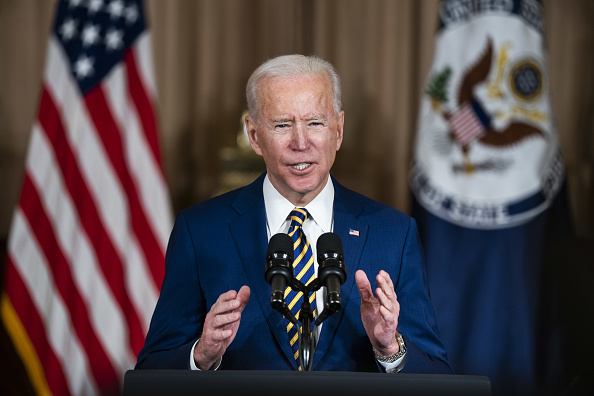
View from Lafayette Square with the Andrew Jackson Statue to the White House in Washington, DC., October 18, 2019. /Getty
View from Lafayette Square with the Andrew Jackson Statue to the White House in Washington, DC., October 18, 2019. /Getty
Editor's note: Thomas O. Falk is a London-based political analyst and commentator. He holds a Master of Arts in International Relations from the University of Birmingham and specializes in U.S. affairs. The article reflects the author's opinions and not necessarily the views of CGTN.
"America is back, diplomacy is back at the canter of our foreign policy." That was the core message in President Joe Biden's first foreign policy speech, which marked the continuation of reversing Donald Trump's policies.
Even Biden's choice of location was a testament of the latter. He picked the State Department, which Donald Trump had labelled the "Deep State Department." It was his way of emphasizing the paradigm shift about to occur: diplomacy will once again start in this building and with each and every one.
Expectations for Biden's visions were correspondingly high.
Parts of his speech was indeed highly coherent and promising, such as the announcement that the U.S. would no longer support the Saudi Arabia-led military campaign in Yemen, or his appeal to European allies, who had been previously first chastised and then alienated by Trump, to once again count on America.
And yet Biden's foreign policy vision left much to be desired. Pivotal geopolitically relevant topics such as the DPRK, the Iran Deal (JCPOA), and Israel were not mentioned.
Instead, Biden too often appeared to get lost in East vs. West clichés and superficialities, but without laying out a roadmap on how to change the status quos or to bridge existing gaps.
For example, Biden urged Moscow to immediately release Alexei Navalny while criticizing China on several fronts.
How exactly he seeks to make Russia and Beijing comply, however, Biden left unanswered. Is he inclined to impose further sanctions on Russia, which, so far, have had little to no effect on President Putin's conduct?

U.S. President Joe Biden speaks at the State Department in Washington, D.C., U.S., Feb. 4, 2021. /Getty
U.S. President Joe Biden speaks at the State Department in Washington, D.C., U.S., Feb. 4, 2021. /Getty
And how does Biden believe he can influence China's decision-making when even a trade war under the previous administration displayed that Beijing is not susceptible nor impressed by attempts of U.S. coercion?
The limitations to the U.S.' capabilities on these matters are more than apparent.
Even rallying around the aforementioned European allies to exert pressure appears increasingly futile. Over these past four years, many European nations became more independent from Washington – a side effect of Donald Trump's treatment. For instance, Europe's de facto leader, Germany, is interested in financial realpolitik first and foremost, not in ideological scuffles for supremacy between Washington and Beijing, and has made it abundantly clear. Other European nations increasingly share Germany's stance.
The latter notwithstanding, Biden has likely missed a significant opportunity in his speech. Considering China's top diplomat Yang Jiechi's address a few days ago, who openly called for cooperation and shared prosperity while emphasizing meddling in Chinese affairs needs to cease, a reciprocation from Biden, a signal in favour of open dialogue and thus the prospects for a reset could have sent a compelling message.
With that being said, despite his rhetoric, and although both Washington and Beijing will continue to have opposing views on various issues, both sides know that they can benefit significantly from one another. President Biden will also be acutely aware of China's importance regarding the world's major challenges in the 21st Century, such as climate change, COVID-19, and terrorism.
And as someone who has always displayed his proclivity for compromises, his speech should not automatically lead to the conclusion that improved Sino-U.S. relations will remain a fantasy.
Particularly as Biden provided a somewhat encouraging hint when he stated cooperation was always on the table when it's in America's interest to do so.
After four years of Donald Trump, it is something to build upon.
(If you want to contribute and have specific expertise, please contact us at opinions@cgtn.com.)

